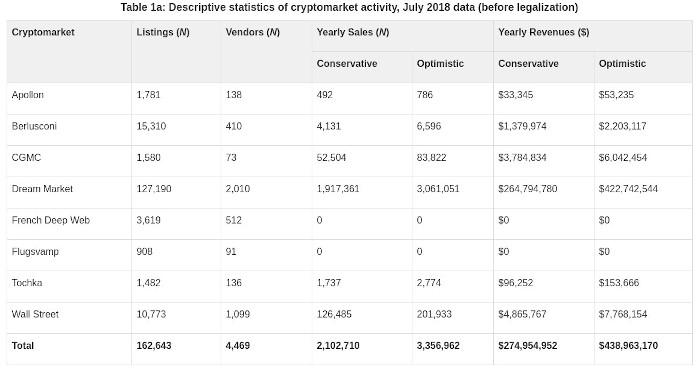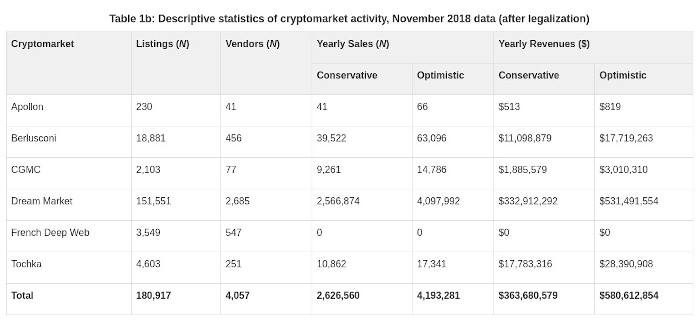Canada: Pot Legalization Increased Darkweb Sales
According to a recent report, illicit international cannabis sales on dark web marketplaces by Canadian vendors have been on the rise since its recreational use was legalized in Canada. The increase in sales has made Canada the fourth largest distributor of cannabis on dark web marketplaces. Public Safety Canada published the report.
To determine the implications of the legalization of recreational cannabis in Canada on the distribution of cannabis on dark web marketplaces by Canadian vendors, the researchers (David Décary-Hétu, Masarah Paquet-Clouston, Martin Bouchard, and Carlo Morselli) analyzed sales made before and after the legalization. The researchers also focused on finding out if the legalization had stopped Canadians from making illicit cannabis purchases on dark web marketplaces.

Before Legalization
In the analysis, the researchers used data collected from various dark web marketplaces in July 2018 and November 2018. The data respectively showed the activities of Canadians on dark web marketplaces before and after cannabis legalization in Canada. In July the researchers collected data from eight darknet marketplaces i.e Apollon, Berlusconi, CGMC, Dream Market, French Deep Web, Flugsvamp, Tochka, and Wall Street. In August the researchers collected data from six marketplaces as they were unable to collect data from Wallstreet and Flugsvamp marketplaces.
The researchers found that;
- When annualized the results of the research showed that the quantity of cannabis shipped from Canada to international buyers rose from hundreds of Kgs to more than 2,000 kgs.
- The revenue generated from sales made by Canadian cannabis dark web vendors rose from hundreds of thousands of dollars to millions of dollars.
- The increase moved Canada from 8th to 4th position behind the US, the UK, and Germany in cannabis sales volume and revenue rankings on dark web marketplaces.
- Canadian dark web cannabis vendors reduced adverts and sales to domestic users.

After Legalization
The researchers attributed these finding to;
- Canadian dark web cannabis vendors recognizing that domestic users would prefer to buy cannabis legally to avoid the costs associated with dark web purchases.
- The vendors shifted their focus to the international focus after the legal market in Canada became competitive.
- When compared to vendors from other countries Canadian vendors have the advantage of being able to source their product legally.
In the report the researchers admit the accuracy of their findings is limited by;
- The fact that to avoid the risk of packages being intercepted by customs authorities most dark web users purchase or sell locally.
- The largest potential market for Canadian dark web cannabis vendors is the US. The US market, however, has stiff competition posed by US vendors based in American states that have legalized cannabis use.
- The short time frame since cannabis was legalized in Canada.
The researchers recommended that;
- The Canadian government enacts measures to ensure that the cannabis that is shipped online legally can be distinguished from the one shipped illegally.
- The government monitors dark web cannabis sales, to understand how it is distributed and identify the vendors.
- Studies are conducted on other online channels to determine if changes similar to those that occurred on dark web marketplaces have taken place on these channels too.
The full report by David Décary-Hétu, Masarah Paquet-Clouston, Martin Bouchard, and Carlo Morselli can be found here.
The abstract provided by the authors of the report:
The internet has evolved into a distribution channel for the illicit sale of drugs. Since 2011, criminal entrepreneurs have taken advantage of anonymous online marketplaces, called cryptomarkets. These platforms facilitate transactions of illegal products and services among many sellers and buyers, leveraging sophisticated technologies, like the Tor network and cryptocurrencies, to ensure anonymity among all participants. Illicit drugs are the most common products sold on cryptomarkets, but other goods and services are also offered, such as stolen financial information and counterfeit products. Cryptomarkets represent a low-risk environment where transactions can take place in an organized manner. The main objective of this report is to understand the illicit cannabis trade by Canadians on cryptomarkets, particularly since very little is known on cryptomarkets at a national level beyond a handful of studies providing fragmented results. This analysis is crucial at a time when the sale of recreational cannabis has been legalized in Canada with the objective of eliminating the black market for recreational cannabis. An examination of trends in cryptomarket sales as cannabis has become legal is an essential step towards understanding the impact of the legalization of recreational cannabis in Canada. To reach the main objective, this project drew from two data sources: the DATACRYPTO software tool and a cryptomarket drug dealer survey. We find that, following the legalization of cannabis, sales of cannabis on cryptomarkets by Canadian dealers appear to show an upward trend. The noted increase is mainly related to sales targeting an international market. When comparing July 2018 to November 2018 sales, Canada moves from 8th to 4th position in terms of cannabis sales on cryptomarkets. It should be noted that the analyses presented in this report are exploratory as the follow-up period post-legalization was extremely short and the data are sparse. These results could change in the long-term, when the legal supply of recreational cannabis is more firmly established, and the legal market has matured.